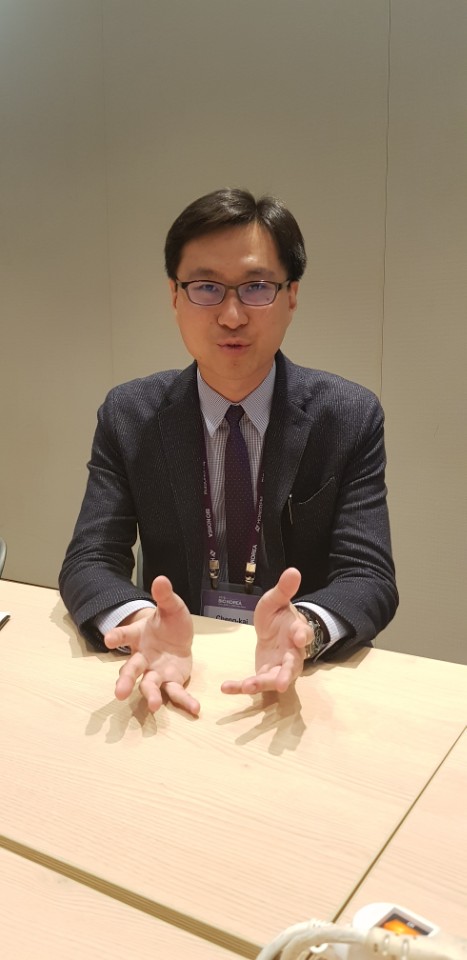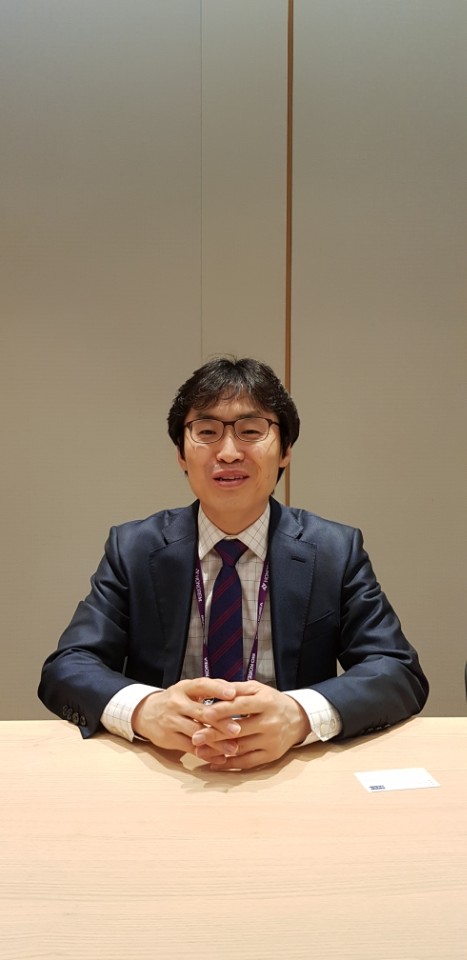With interests in AI and Big Data related to healthcare sky-rocketing, it is necessary to assess the current situation and prepare for the future with experts in this field, Korean and foreign.
The ongoing Bio Korea 2018, an annual industry fair organized by the Korea Health Industry Development Institute (KHIDI), offers valuable opportunities to do so. Two renowned professors – Professors Cheng-Kai Kao and Choi Seong-ho – went in depth about their works and thoughts in the area on the sidelines of the event.
‘Computers cannot, and should not, replace doctors’

“There is nothing new about AI and Big Data. We have had Big Data for a long time now,” said Professor Cheng-Kai Kao of the Department of Medicine at the University of Chicago. “The difference is that now we are paying more attention to the quality of the data, while also having more digital and discreet data than before.”
With all that new attention, scientists and industrialists are now able to generate different types of AI and decision support systems on what they have, Kao added.
Benefits of AI and Big Data outlined by Professor Kao include mutual learning process between medical staffs and the AI, having a fresh set of “eyes” on disease and developing precision medicine. Such positive aspects will ultimately help take care of the patient in a more efficient manner.
“In the past when a patient comes to the hospital we conventionally gave the same treatment for same diseases,” Professor Kao said. “We realized even back in 2001, however, certain patients do not respond to specific medications because of their genetic profile.”
Although that was the case, during that time medical workers treated them equally. In part because they didn’t have the computing power to digest a patient’s genetic data set and because they had no places to store that data and the high cost of sequencing someone’s genome, Kao noted.
“This is no longer an issue as we have solved all those issues and we can treat patients differently and apply precision medicine to patients based on their genomes,” Kao said.
However, Kao stressed that advances in AI and Big Data do not mean that it will ultimately replace doctors and medical staffs.
“The ultimate goal in the field is to provide better care for the patients, and it was never meant to replace the doctor to patient or human to human relationship,” Kao said. “The last thing we want is to see doctors looking at their computer results rather than seeing their patients.”
AI is never meant to replace a human’s touch, Kao added.
Regarding comments from experts that humanity should take a more precautious stance toward AI, Professor Kao stated that stopping the development of AI is now impossible.
“We cannot stop people from developing or using AI to develop new technologies,” Kao added. “What we can do is to make sure people are doing it in the right way and prevent the technology being used in areas such as the military.”
Kao noted that another important part of using AI and Big Data is protecting personal information.
“In the U.S., security is one of the most important issues,” said Kao. “It is hard for hackers or doctors to use patient data from hospitals as it is heavily protected from the Health Insurance Portability and Accountability Act (HIPAA).” The law mandates the recording of any interaction with a patient’s data, Kao added.
However, Kao stressed that smartphone applications are a different subject. “When it comes to applying some of the follow HIPPA regulations, while others do not,” Kao said, noting that the applications that don’t follow regulations are open to hacking and leaks, which can, in turn, harm the patients.
“Recently, the authorities concerned have started putting up regulations for apps as well, and I believe that it will soon cover all applications as well,” Kao added.
‘Regulatory reform can lift Korea to leader of AI healthcare’

“There are two main areas that developers have to focus on when developing an AI and Big Data system for medical use,” said Professor Park Seong-ho of the radiology department at Asan Medical Center. “First, developers need to prove the system clinically and reflect the need of the people in the field such as medical professionals or patients.”
Surprisingly, however, the two parts are vastly overlooked with the current AI boom, Park noted.
Everyone is only concentrating on the technology aspect while setting aside essential factors such as benefiting patients and the medical professionals using the technology, he noted.
Park stressed that for AI to help patients, the domain between technology and healthcare needs to unite.
“In the past, companies would advertise that AI will revolutionize the healthcare industry and take care of all medical procedures,” Park said. “However, this caused medical professional in the field to turn away from using such equipment, which led to poor and meaningless results.”
Thankfully, since the end of last year, such census has changed, and developers and medical professional now all acknowledge the importance of clinical verification and what are necessary to make a “Killer App” in the field, Park added.
To develop such “Killer App,” Park pointed out that it is essential to make the AI and Big Data technology apply to any institution.
“Big Data used in AI comes in randomly. It might not necessarily meet criteria such as age or sex that the system is targeting,” Park said. “Therefore, it is important that developers apply the data to various institutions to obtain similar results before launching the product.”
The data also has to be open and unbiased so that others can also verify the results, Park added.
Regarding concerns and criticism about Korea falling behind AI and Big Data due to strict regulations, Park noted that it is not necessarily so.
“Although Korea might be lagging a little, it has not fallen behind,” Park said. “The reason developers might think that we are falling behind is due to the slow approval process from the Ministry of Health and Welfare and the Ministry of Food and Drug Safety.”
It is the government’s job to standardize and change the approval process, which the government has started to do, Park added.
“Also, the U.S. and other advanced nations have prepared for the process for a long time by, for instance, setting up a system to protect patient information and receiving patient consent,” Park said. “However, it is important to realize the issue is not only on personal security but creating public consensus.”
As of now, both the setting and public consent is not up to that of advanced countries, Park pointed out.
“Additionally, even if developers receive data, it will not help them if they receive data from a few decades ago as the industry has developed far past that phase,” Park said. “The good thing is general hospitals and the government is changing its attitude in line with the Fourth Industrial Revolution, and the data collected right now will be of great use shortly.”
Park added that it is essential for everyone to work together if Korea wants to speed up its process of using AI and Big Data.
“Developing a technology fast so we can profit off them by, for instance, creating jobs along the way is a dangerous concept,” Park said. “The process has to be done right with cooperation from the government, medical sector and the business sector.”
“Regarding development cooperation, a lot of doctors still have a hard time grasping what AI and Big Data are, while some developers only focus on successfully putting their product on the market,” Park said. “For governmental cooperation, redundant funding on similar projects by different agencies has to stop.”
In conclusion, Park stressed Korea is full of potentials and, if appropriately supported, can become a world leader in healthcare AI and Big Data.
“Korea’s medical cost is low compared to other advanced countries while having similar or better clinical knowledge,” Park said. “It also has a centralized system that collects rich data, which is highly accessible.”
Such aspects can boost Korea into a world-leader in the field, Park added.

